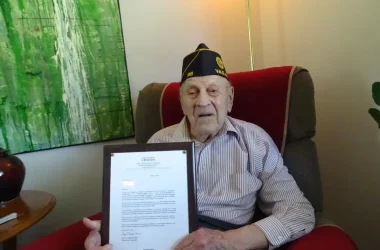
Mayor Ron Verini is leading a pro-sales tax political action committee in the latest twist in the saga of the proposed levy. (The Enterprise/File)
ONTARIO – A political action committee headed by Ontario Mayor Ron Verini has already collected more than $10,000 to promote the city’s 1 percent sales tax.
“Citizens for a Better Ontario” formed in January and lists Verini as its director. The treasurer is listed as Charlene Pellend of Ontario.
The competing political action committee, STOP The New Sales Tax, opened with a contribution of $4,913 and had a balance recently after legal expenses of $2,564.
The competing political action committees are focused on one measure on the primary ballot in May – the proposed Ontario sales tax. Only voters in Ontario will have a say in the levy.
The Ontario City Council approved a 1 percent sales tax last fall but a measure that would block the tax was referrd to voters by petitioners.
Verini has donated $3,300 to his political action committee, according to state campaign finance reports.
“It’s just a bunch of us getting together promoting the 1 percent and getting information out,” Verini said.
“The group is a loosely knit group of individuals that have our concerns at stake for our community.”
The biggest funder is Ontario-based TQ Properties, which owns the Clarion hotel. Bob Quinn, its president, is former president of the Ontario Chamber of Commerce and still sits on its board.
The chamber has taken no position on the city tax.
Quinn’s company donated $5,000 to the pro-sales tax force.
The other major donor is former city councilor Charlotte Fugate, who gave $500. Fugate is also the co-chairman of Revitalize Ontario!, a committee aimed at improving the appearance of the city.
The campaign finance records show that another councilor, Marty Justus, covered $154 in food costs for an informational event the campaign held last Saturday at Eastside Park in Ontario.
The group also has a website and a Facebook page.
“Our ad is up at the Reel Theater and there is literature and information on our website as well as on Facebook,” said Verini.
Three Ontario-area residents are running the political action campaign to reject the tax – Larry Tuttle, Daniel Lopez and Jackson Fox. They have not reported any major cash contribution since the political action committee’s initial donation.
The only expense listed so far is $2,349 paid to Wilsonville attorney Eric Winters. Winters also donated $1,000 in services.
He represented the petitioners’ challenge of the wording used by city officials to describe the ballot measure. The city agreed to change the wording to more clearly reflect the measure would repeal the tax.
City officials expect to collect about $3.8 million from the levy. However, the plan drew criticism from a group of local business leaders and residents who led a successful campaign to put the proposal on the May ballot for voters to decide. Some business owners said they feel that the tax will take away one of Ontario’s main advantages as a place shoppers can visit to avoid Idaho’s 6 percent sales tax.
Ashland and Yachats are the only other Oregon cities with a sales tax.
The Ontario tax is narrowly tailored to retail goods while excluding vehicle sales and agriculture products.
Also, products such as gasoline and tobacco, which are already subject to state tax, will not be part of the proposed duty.
The city has issued informational sheets describing how the city would use the money.
Fox, one of the tax opponents, complained to state elections officials that the material represented illegal campaigning by public officials.
“It is biased,” Fox said.
Brown said the city submitted its draft handout to the state Elections Division for a “safe harbor” review. In such a review, state officials analyze information government agencies want to provide to ensure it isn’t biased.
Brown said the handout went through several revisions before the state approved it March 9.
Brown said the alterations were minor.
“It is amazing how much they ask you to do. They have very specific words they want you use,” said Brown.
Brown said the state asked the city to change about four words.
“Two times we used the word ‘will’ and they made us change it to ‘would,’” said Brown.
Reporter Pat Caldwell: [email protected] or 541-473-3377.




